What is Digital Marketing Course? In today’s digital age, it is a structured learning program designed to equip individuals with the skills and strategies needed to thrive in online marketing. It covers a wide range of topics, including SEO, social media marketing, email campaigns, content creation, and data analytics, offering a comprehensive understanding of how to connect with audiences in the digital space. As businesses continue to prioritize their online presence, these courses have become essential for professionals and entrepreneurs looking to gain a competitive edge. In this complete guide for 2025, we’ll delve into what a digital marketing course offers, its benefits, career opportunities, and the latest trends shaping the industry—providing a clear roadmap to success in the ever-evolving world of digital marketing.
Introduction to Digital Marketing
Overview of Digital Marketing
Digital marketing refers to the promotion of products, services, or brands through digital channels and technologies. It encompasses all online marketing efforts and utilizes various platforms such as search engines, social media, email, and websites to reach potential customers. In today’s digital era, businesses are increasingly leveraging online channels to connect with consumers, build brand awareness, and drive sales.
Some common digital marketing strategies include:
- Search Engine Optimization (SEO) – Optimizing a website to rank higher in search engine results and drive organic traffic.
- Content Marketing – Creating and distributing valuable content to attract, engage, and retain a target audience.
- Social Media Marketing – Using platforms like Facebook, Instagram, LinkedIn, and Twitter to promote brands, engage with customers, and drive traffic.
- Email Marketing – Using emails to reach potential and existing customers with promotions, newsletters, and updates.
- Pay-Per-Click Advertising (PPC) – Paying for ads that appear on search engine results pages or social media platforms, typically based on a cost-per-click model.

These strategies are interconnected and, when used together, provide a comprehensive approach to reaching the right audience with the right message at the right time.
Importance of Digital Marketing in Today’s World
Digital marketing has become an essential aspect of business success, particularly due to the rise of the internet and the growing reliance on online tools for communication, shopping, and entertainment. Below are the key reasons why digital marketing is crucial for modern businesses:
- Global Reach: With digital marketing, businesses are not confined by geographical boundaries. A well-optimized website or social media page can reach audiences anywhere in the world. This allows small businesses to compete with larger companies on a global scale.

- Cost-Effectiveness: Compared to traditional marketing methods (e.g., print ads, television commercials), digital marketing offers more affordable and flexible options. Businesses can adjust their budgets according to the effectiveness of their campaigns.
- Targeted Advertising: One of the most powerful aspects of digital marketing is the ability to target specific audiences. Through tools like Google Ads and Facebook Ads, businesses can create highly targeted campaigns based on age, gender, location, interests, behaviors, and more.
- Measurable Results: Digital marketing allows for precise tracking of campaign performance. Metrics like website traffic, conversion rates, click-through rates, and social media engagement can be monitored in real-time. This data-driven approach enables businesses to optimize their marketing strategies for better results.
- Improved Customer Engagement: Digital marketing facilitates direct interaction with customers. Social media platforms, email newsletters, and chatbots allow businesses to engage with their audience, answer queries, and provide a more personalized experience.
- Better ROI: The return on investment (ROI) in digital marketing is often higher than traditional marketing. With the ability to track results and optimize campaigns continuously, businesses can ensure their marketing dollars are spent effectively.
- Building Brand Authority: Digital marketing helps establish trust and authority. Through content marketing, SEO, and customer reviews, businesses can showcase their expertise, build credibility, and position themselves as leaders in their industry.
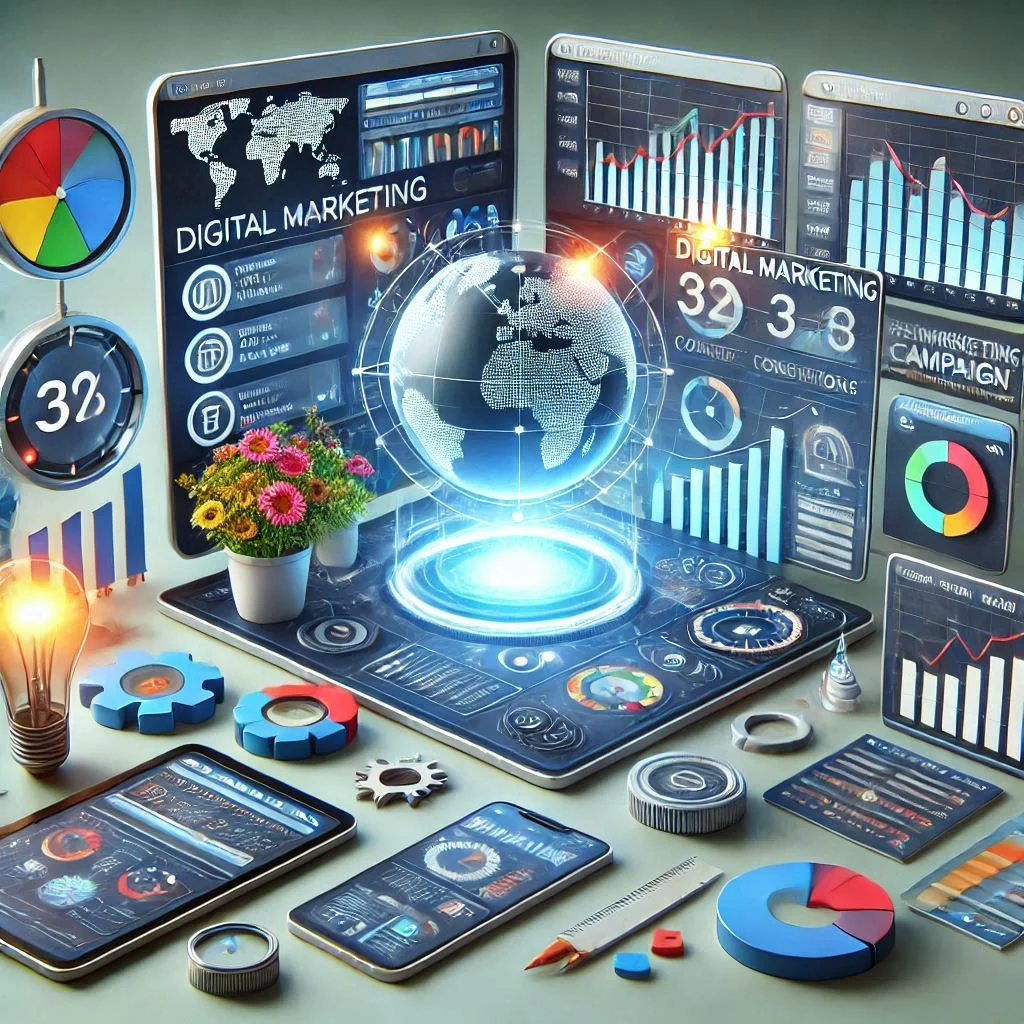
- Real-Time Interaction: With digital marketing, businesses can engage with customers in real-time. Social media platforms, live chats, and instant messaging offer instant communication, which is highly valued by consumers.
What is Digital Marketing and How Does it Work?
Definition of Digital Marketing
Digital marketing is the use of digital channels, platforms, and technologies to promote and sell products or services to consumers. Unlike traditional marketing methods, which primarily rely on physical media like newspapers, billboards, or TV ads, digital marketing leverages the internet, mobile devices, social media platforms, email, search engines, and other digital tools to reach a broader audience in a more efficient and cost-effective manner.
Digital marketing covers a wide variety of tactics, strategies, and platforms, each tailored to engage customers at different stages of the buying journey. It includes everything from SEO (search engine optimization) to paid search ads, content marketing, social media marketing, email marketing, and affiliate marketing.
With the increasing shift towards online engagement, businesses must adopt digital marketing strategies to stay competitive. It allows businesses to directly reach their target audience at the right time, with personalized messaging, and track their marketing efforts with precision.
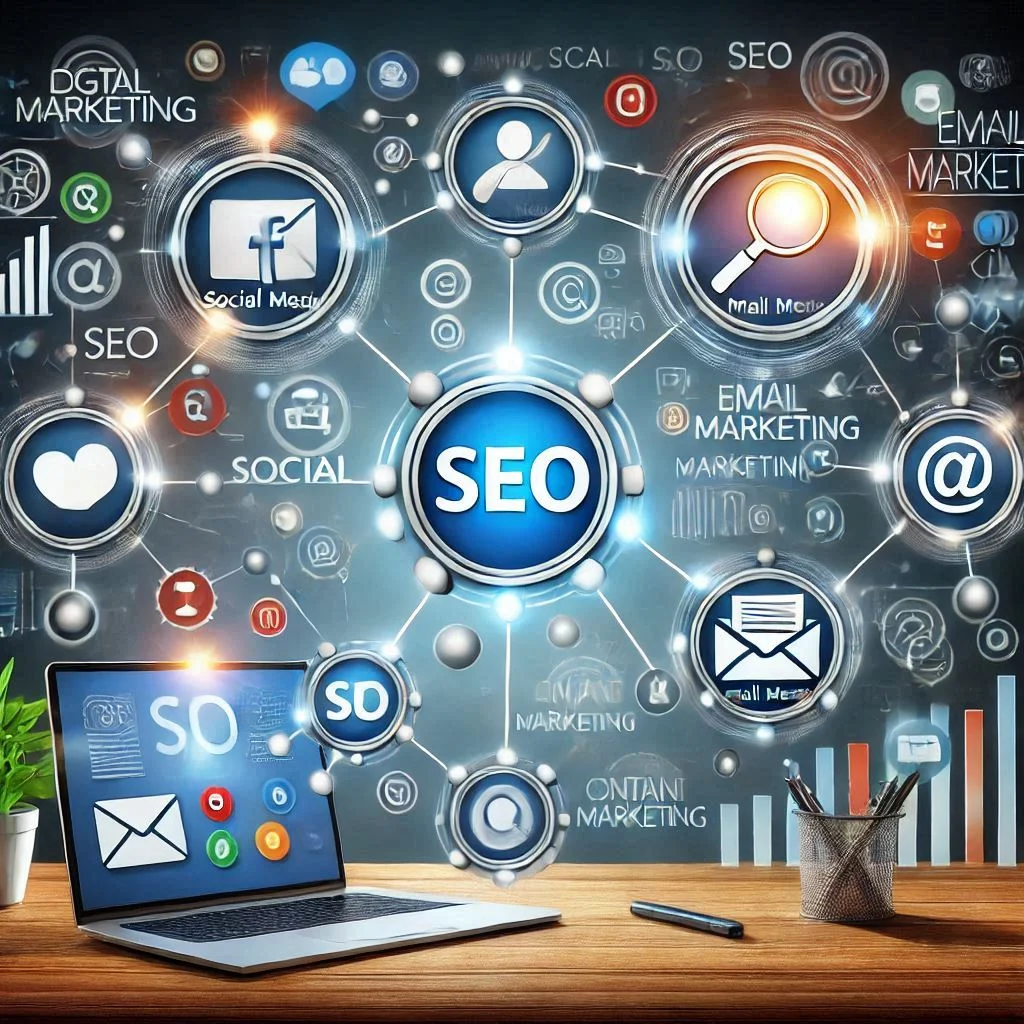
The Mechanics of Digital Marketing and Its Various Channels
Digital marketing operates through a multi-channel approach, where each channel serves a specific purpose in reaching and engaging customers. Let’s explore the mechanics behind each of the primary digital marketing channels:
- Search Engine Optimization (SEO): SEO is a fundamental part of digital marketing that focuses on improving a website’s visibility in search engine results pages (SERPs). By optimizing on-page elements (like keywords, content, and metadata) and off-page elements (such as backlinks), businesses can drive organic (non-paid) traffic to their websites. The goal is to rank higher for relevant search queries to attract users who are actively searching for products or services.SEO is powered by various ranking factors, such as keyword relevance, website structure, page load speed, mobile-friendliness, and backlinks. Understanding these factors and optimizing accordingly is essential for increasing website visibility and driving high-quality traffic.
- Social Media Marketing (SMM): Social media platforms like Facebook, Instagram, Twitter, LinkedIn, and TikTok provide an opportunity to engage with your audience directly, promote products, and build brand awareness. Social media marketing allows businesses to create organic content or run paid ad campaigns to drive traffic to their websites or increase engagement with their content.The mechanics behind SMM involve creating a content strategy, targeting the right audience through ads, using hashtags to increase discoverability, and engaging with followers through comments, likes, and shares. Social media analytics are also important for measuring success and optimizing future campaigns.
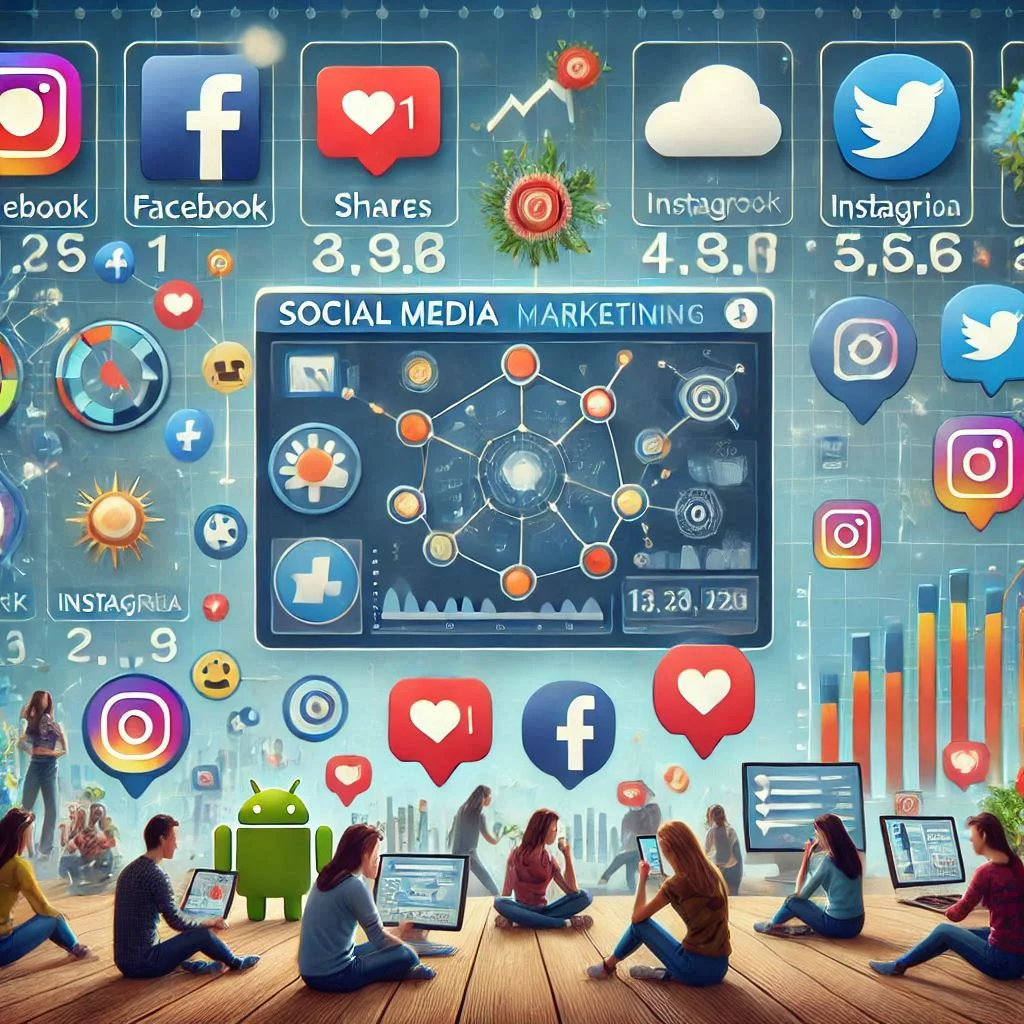
- Email Marketing: Email marketing is one of the oldest and most effective digital marketing strategies. It involves sending targeted emails to prospects or customers with the aim of nurturing relationships, promoting offers, or keeping them informed about products and services.A successful email marketing campaign relies on a well-maintained email list, personalized content, and clear calls-to-action (CTAs). Marketing automation tools are often used to segment lists, send automated messages, and track the performance of email campaigns. With the right strategy, email marketing can yield high returns with relatively low costs.
- Pay-Per-Click Advertising (PPC): PPC is a paid advertising model where businesses pay each time a user clicks on one of their ads. Google Ads and Bing Ads are popular platforms for running PPC campaigns, where businesses bid on keywords related to their products or services. The ads then appear in search results or on websites that participate in ad networks.The mechanics of PPC involve selecting relevant keywords, setting a budget, creating compelling ad copy, and choosing the right bidding strategy. Monitoring the performance of PPC campaigns is essential for ensuring optimal ad spend and maximizing ROI.
- Content Marketing: Content marketing focuses on creating valuable and relevant content to attract and engage your target audience. This can include blog posts, videos, infographics, case studies, eBooks, and podcasts. By providing educational, entertaining, or informative content, businesses can build trust and authority, driving both organic traffic and brand loyalty.The key to successful content marketing lies in understanding your audience’s pain points, needs, and interests. Quality content that provides solutions to these challenges can help increase conversions, build a strong customer base, and improve SEO performance.
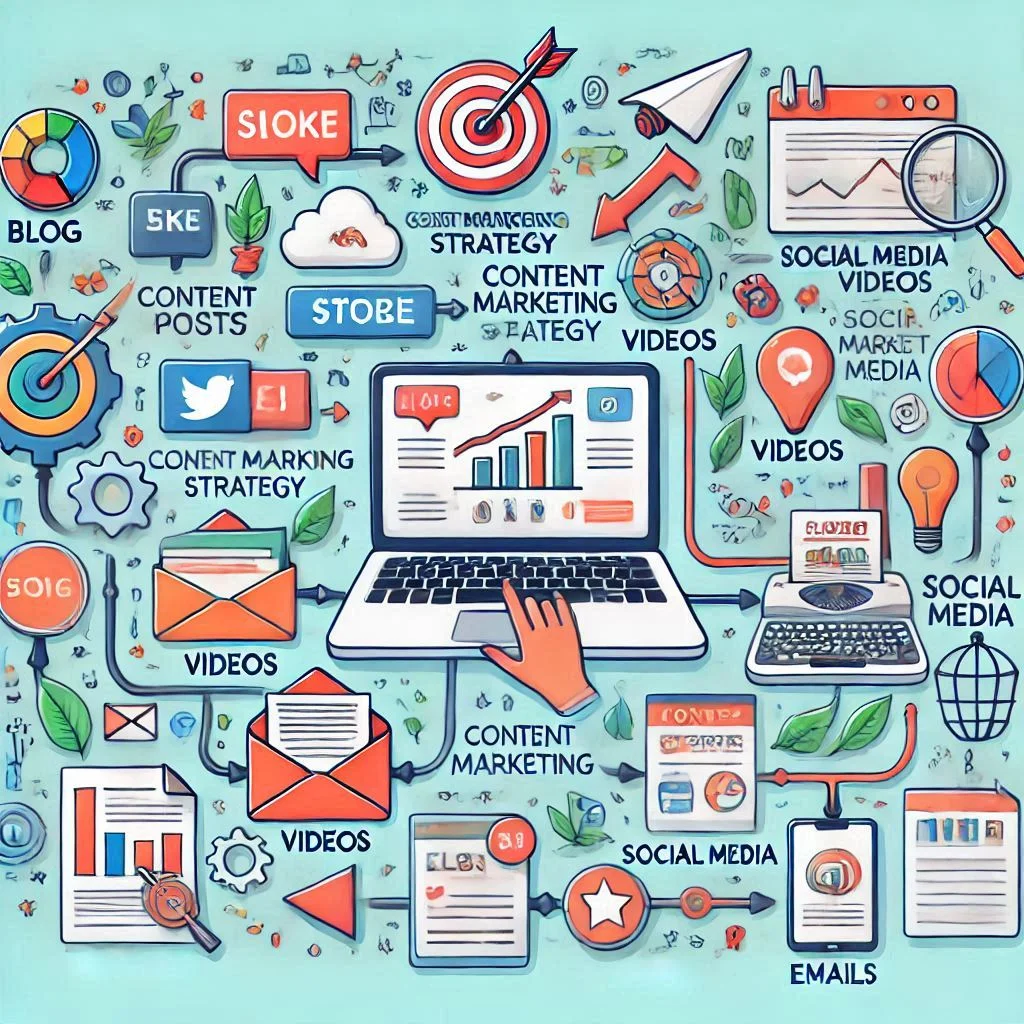
- Affiliate Marketing: Affiliate marketing allows businesses to partner with individuals or other companies (affiliates) who promote their products in exchange for a commission on sales generated through their referral links. This is a performance-based marketing model where businesses only pay when a sale is made.The mechanics of affiliate marketing involve choosing the right affiliate partners, setting commission rates, providing affiliates with the necessary marketing materials, and tracking sales through affiliate networks.
- Influencer Marketing: Influencer marketing is a strategy where businesses collaborate with influencers (individuals with a large following on social media platforms) to promote their products or services. Influencers have established credibility and trust with their audience, which can help drive brand awareness and influence purchase decisions.The mechanics of influencer marketing involve selecting the right influencers based on their relevance to the brand, negotiating terms, and tracking the performance of campaigns through metrics like engagement, clicks, and conversions.
How Digital Marketing Works Together
Digital marketing channels do not work in isolation; they complement each other and often overlap to create a holistic marketing strategy. For example, a business may use SEO to drive organic traffic to their website, use social media marketing to promote blog posts, and leverage email marketing to nurture leads generated through social media ads.
A comprehensive digital marketing strategy combines the strengths of each channel, allowing businesses to engage with their target audience at various touchpoints along the customer journey—from initial awareness to final purchase and beyond.
By understanding the mechanics of each digital marketing channel and integrating them into a unified strategy, businesses can increase brand visibility, generate leads, and boost conversions.
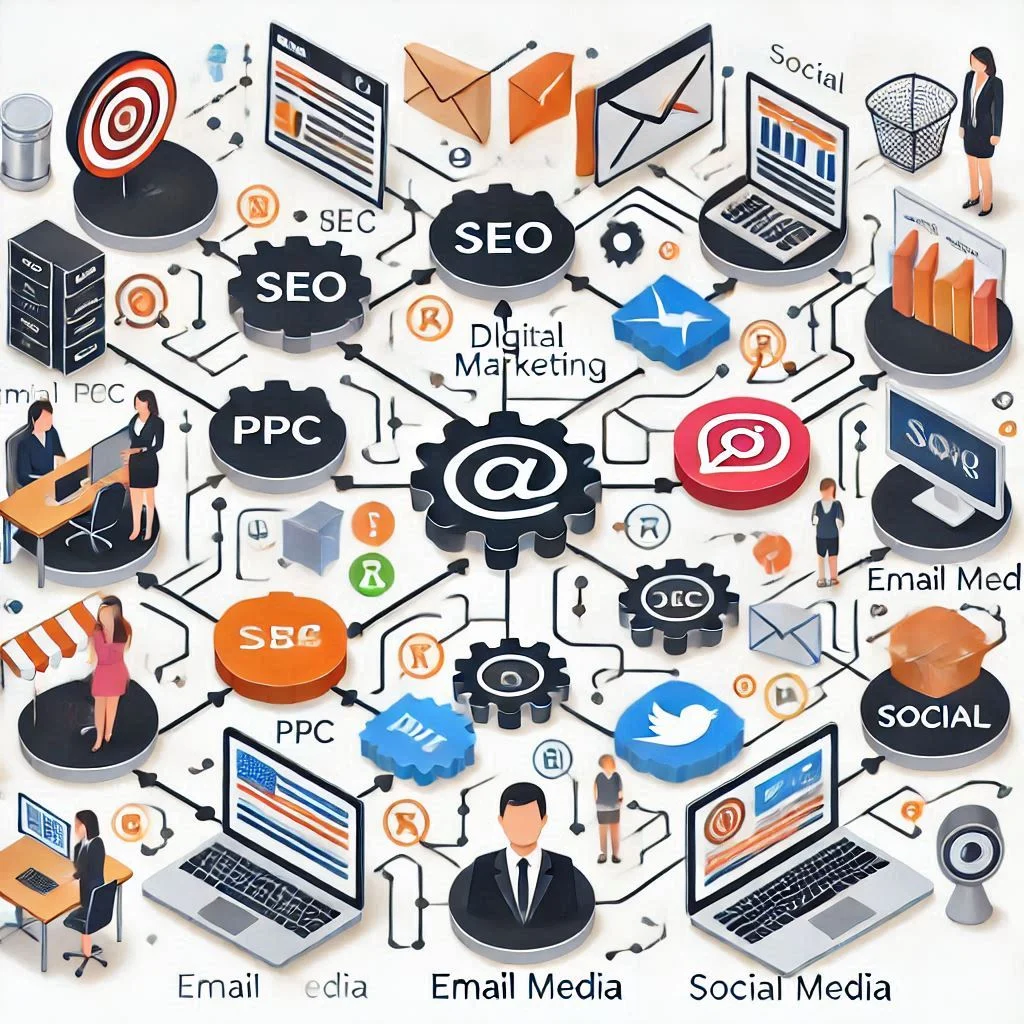
With these tactics and a focus on understanding your audience, digital marketing provides a powerful toolset for businesses to thrive in the digital age.
Benefits of Digital Marketing
Key Advantages of Digital Marketing for Businesses
Digital marketing offers unparalleled benefits that help businesses stay competitive and thrive in today’s technology-driven world. Below are the key advantages:
- Cost-Effectiveness:
Compared to traditional marketing methods, digital marketing is more affordable and provides a higher return on investment (ROI). Businesses of all sizes can run campaigns with budgets tailored to their financial constraints.For instance, running a social media ad campaign on platforms like Facebook or Instagram costs significantly less than traditional print or TV ads while targeting a more specific audience.
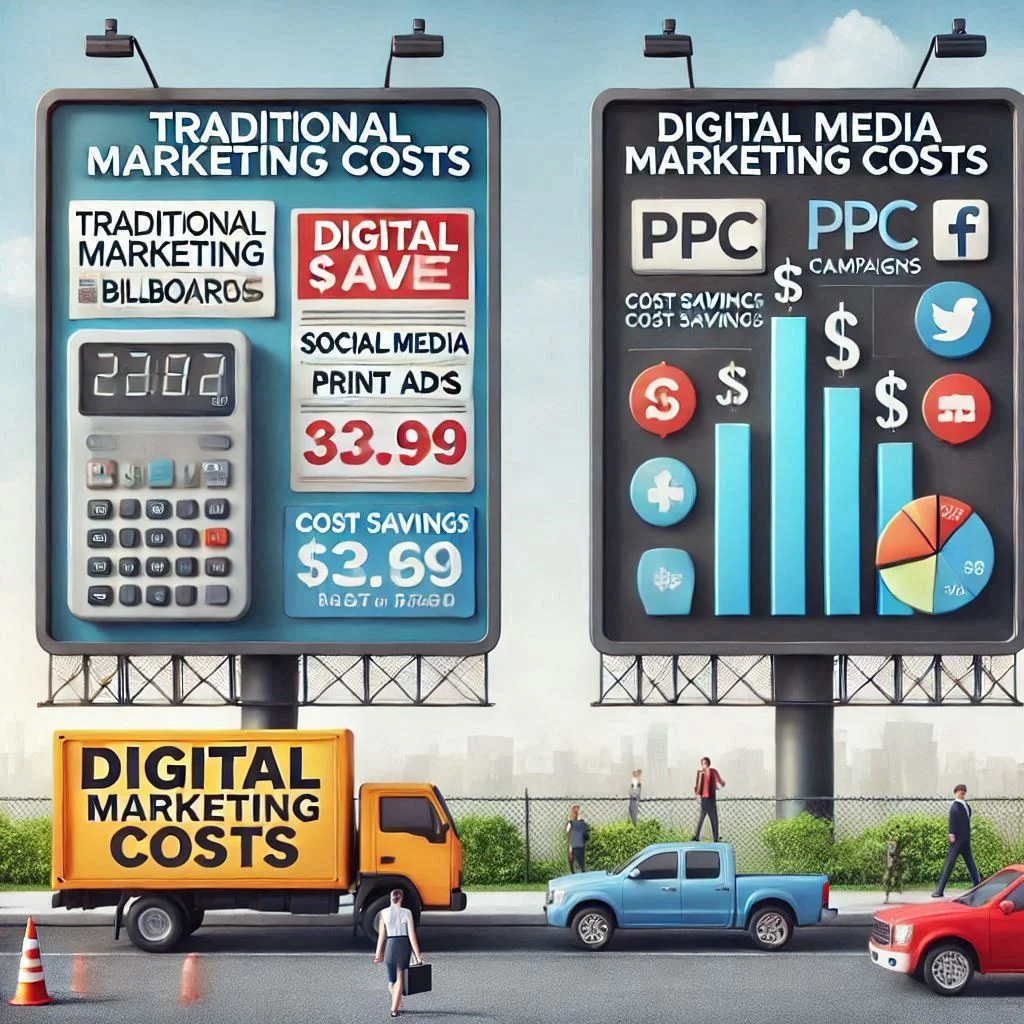
- Measurable Results:
Digital marketing provides businesses with precise data and analytics to measure the performance of their campaigns. Tools like Google Analytics, social media insights, and email campaign trackers allow marketers to monitor engagement, click-through rates, conversion rates, and ROI in real-time. - Improved Audience Targeting:
Unlike traditional marketing, which often involves broadcasting a message to a broad audience, digital marketing allows businesses to target specific demographics, behaviors, and preferences.
For example, through tools like Google Ads or Facebook Ads Manager, businesses can create highly targeted campaigns to reach users based on their age, location, interests, and online behavior. - Flexibility and Scalability:
Digital marketing campaigns can be adjusted or scaled in real-time based on performance. Whether it’s increasing ad spend during a high-traffic season or tweaking ad copy to improve engagement, the flexibility of digital marketing ensures businesses can adapt to changing market conditions. - Higher Engagement Levels:
Social media platforms, interactive content, and email campaigns foster direct communication with consumers, enabling businesses to build trust and long-lasting relationships. Engaging directly with customers enhances brand loyalty and increases the likelihood of repeat business. - Personalization:
Digital marketing allows for personalized customer experiences. Businesses can send tailored emails, recommend products based on browsing history, or display ads aligned with user preferences. This personalized approach increases customer satisfaction and boosts conversion rates.

How It Helps Businesses Grow and Reach Global Audiences
- Global Reach:
Digital marketing removes geographical boundaries, enabling businesses to reach audiences worldwide. A small local business can use tools like Google Ads or social media platforms to target customers across the globe, breaking into international markets without the need for physical expansion.For example, an e-commerce store can leverage SEO and PPC campaigns to attract customers from multiple countries, significantly increasing its customer base and revenue potential. - Enhanced Brand Visibility:
Online channels such as search engines, social media, and email marketing increase a brand’s visibility, ensuring that it stays top-of-mind for potential customers. Consistent online presence builds credibility and positions the business as an authority in its industry. - Supports Small Businesses and Startups:
Digital marketing levels the playing field for small businesses, allowing them to compete with larger organizations. Through cost-effective campaigns and precise targeting, even businesses with limited budgets can attract and convert customers effectively.

- Real-Time Interactions:
Digital marketing facilitates immediate communication between businesses and their audiences. Through live chats, instant messaging on social media, or comments on blog posts, businesses can resolve queries, provide customer support, and foster meaningful connections in real-time. - Facilitates Market Expansion:
By utilizing digital tools such as social media platforms, influencer collaborations, and multilingual website content, businesses can tap into new markets effortlessly. They can also analyze audience insights to identify trends and preferences in different regions. - Increases Conversions and Revenue:
With highly targeted campaigns and optimized content, digital marketing drives more conversions than traditional methods. By nurturing leads through retargeting ads, email campaigns, or personalized content, businesses can guide potential customers down the sales funnel, turning them into loyal buyers.
Skills You’ll Learn in a Digital Marketing Course
Core Digital Marketing Skills Like SEO, SEM, Social Media Marketing, etc.
A digital marketing course equips learners with a wide array of core skills essential for building and executing effective marketing strategies. Here are the primary skills covered:
- Search Engine Optimization (SEO):
SEO is the foundation of digital marketing. You’ll learn how to optimize websites for search engines to improve visibility and drive organic traffic. Topics include keyword research, on-page and off-page SEO, technical SEO, and analytics to measure success. - Search Engine Marketing (SEM):
SEM focuses on running paid advertisements on search engines like Google and Bing. You’ll understand how to create ad campaigns, bid on keywords, write compelling ad copy, and track the performance of your ads to maximize ROI.
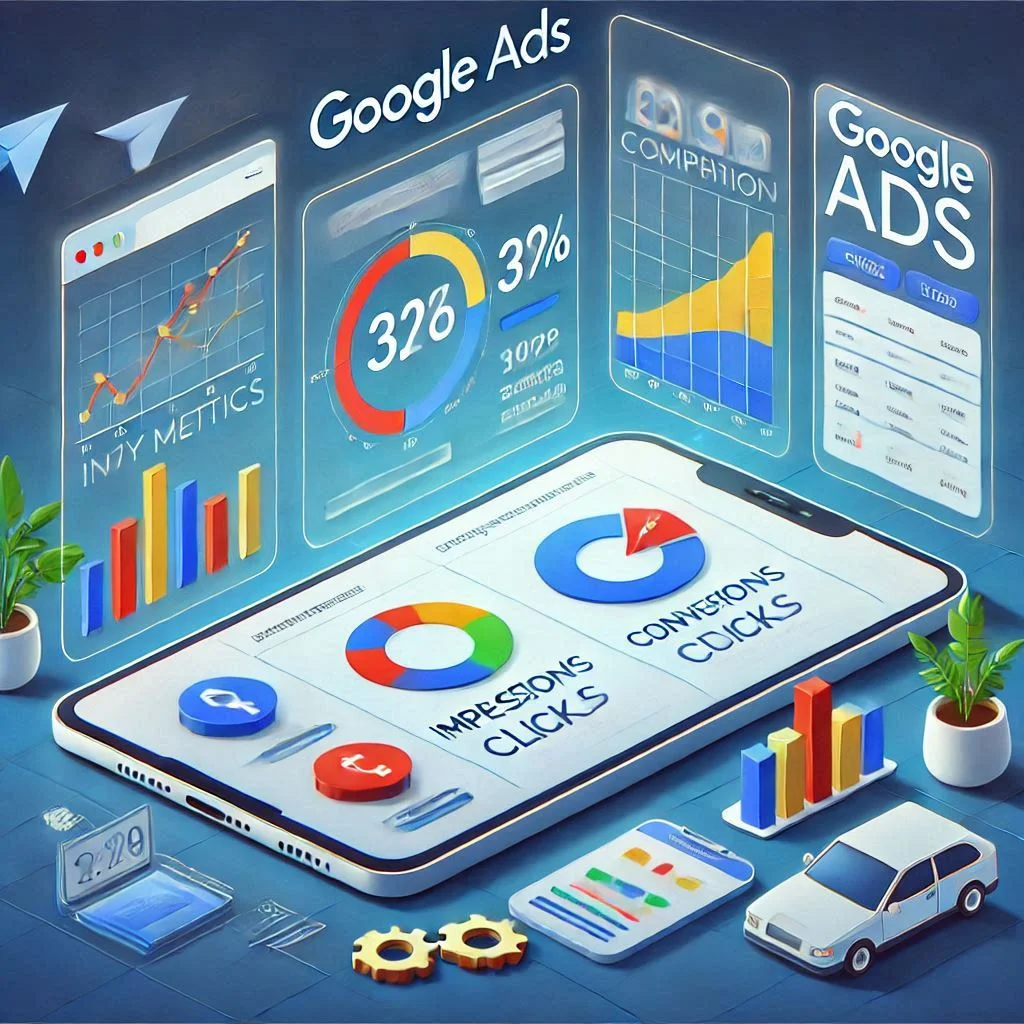
- Social Media Marketing (SMM):
You’ll learn how to build and manage social media campaigns on platforms such as Facebook, Instagram, Twitter, LinkedIn, and TikTok. The course will cover strategies for increasing engagement, creating viral content, and leveraging social media ads. - Content Marketing:
Mastering content creation and distribution is critical in digital marketing. You’ll learn how to create engaging blog posts, videos, infographics, and more to attract and retain your target audience while building authority in your niche. - Email Marketing:
Learn how to craft personalized email campaigns that nurture leads, drive conversions, and foster long-term customer relationships. Topics include building email lists, creating templates, and using automation tools. - Analytics and Data Interpretation:
You’ll gain skills in using tools like Google Analytics, heatmaps, and social media insights to track campaign performance, measure KPIs (Key Performance Indicators), and make data-driven decisions.
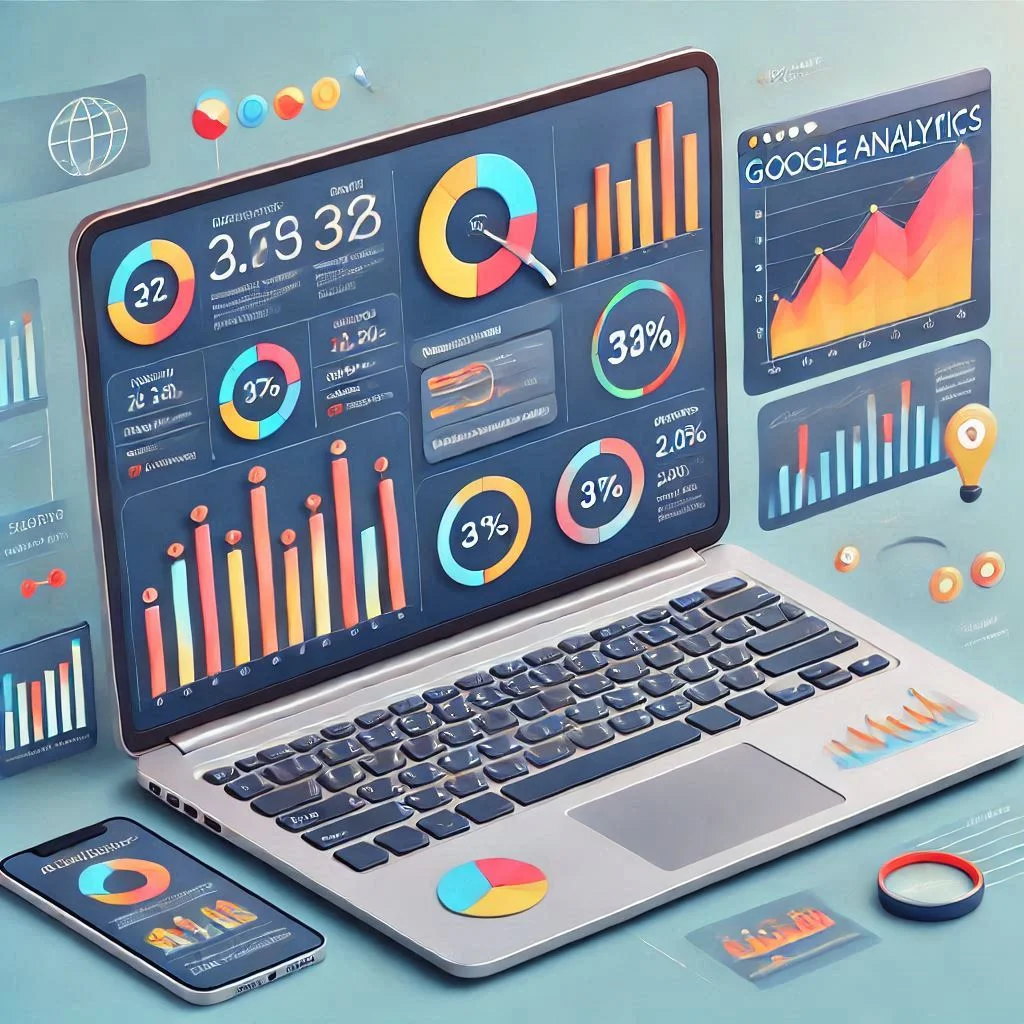
- Affiliate Marketing:
This module will teach you how to set up and manage affiliate programs, collaborate with partners, and track sales to grow revenue effectively. - Conversion Rate Optimization (CRO):
Learn techniques to optimize landing pages, forms, and websites to increase the percentage of visitors who complete a desired action, such as purchasing a product or signing up for a newsletter.
Tools and Platforms Used in Digital Marketing
Modern digital marketing relies heavily on various tools and platforms. A good digital marketing course will familiarize you with the most popular ones, including:
- SEO Tools:
- Google Search Console: For monitoring website performance in search results.
- SEMRush and Ahrefs: For keyword research, competitor analysis, and backlink tracking.
- Yoast SEO: A WordPress plugin for optimizing content.
- Zooli AI SEO: An amazing SEO ai tool.
- Analytics Tools:
- Google Analytics: For tracking website traffic and user behavior.
- Hotjar: For understanding user interactions through heatmaps.
- Social Media Management Tools:
- Hootsuite and Buffer: For scheduling and managing social media posts.
- Canva: For creating engaging visual content.
- Mailchimp: For designing and sending email campaigns.
- HubSpot: For email automation and CRM integration.Email Marketing Platforms:
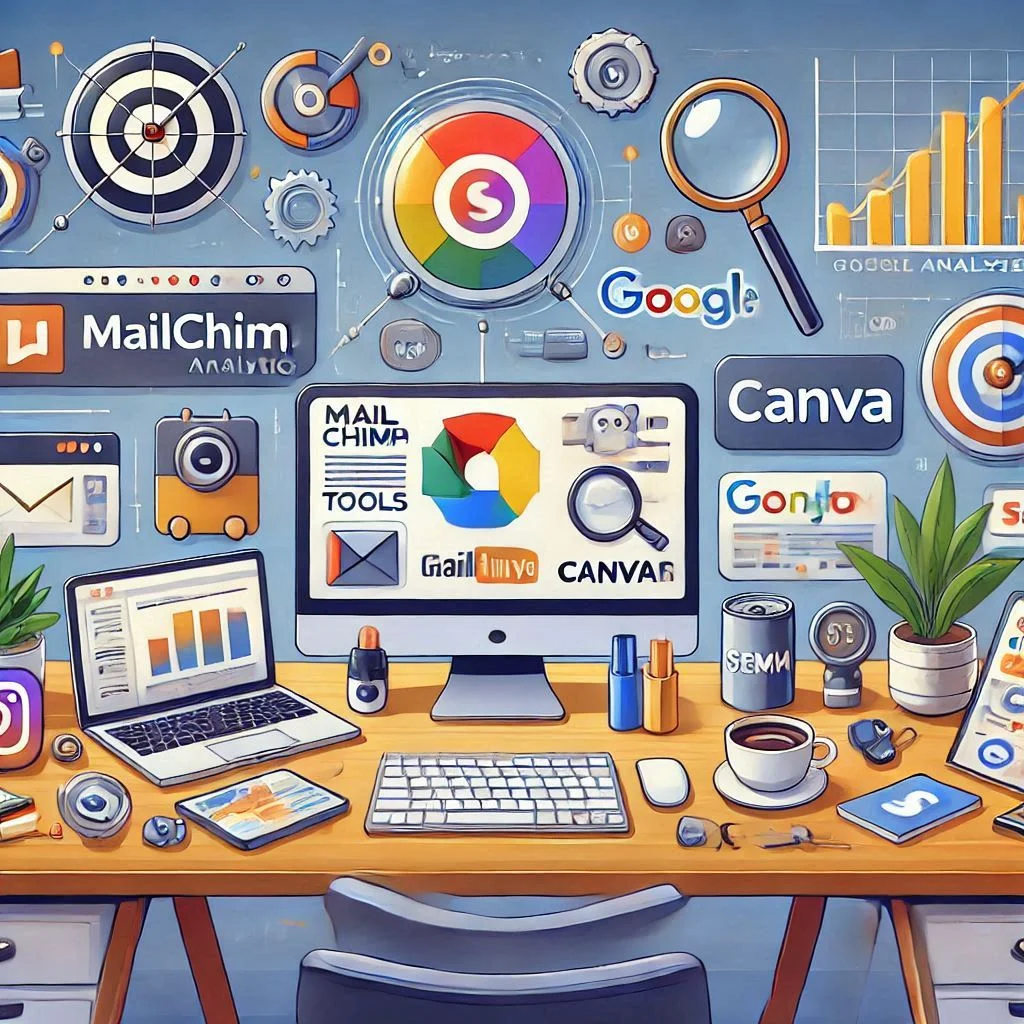
- Advertising Platforms:
- Google Ads: For search and display ad campaigns.
- Facebook Ads Manager: For social media advertising.
- Content Management Systems (CMS):
- WordPress: For creating and managing websites.
- Wix: For building simple websites quickly.
- Video and Graphic Tools:
- Adobe Creative Suite: For creating high-quality visuals and videos.
- Piktochart: For designing infographics and presentations.
Digital Marketing Strategy: How to Create One
Steps to Create a Digital Marketing Strategy
Creating an effective digital marketing strategy involves several steps that ensure your efforts are targeted, measurable, and aligned with your overall business objectives. Here’s a detailed guide:
1. Define Your Goals
Start by identifying clear, measurable, and achievable marketing goals. Common objectives include:
- Increasing brand awareness
- Driving website traffic
- Generating leads
- Boosting sales
Use the SMART framework: Specific, Measurable, Achievable, Relevant, and Time-bound goals. For example, “Increase website traffic by 25% in the next three months through SEO optimization and social media campaigns.”
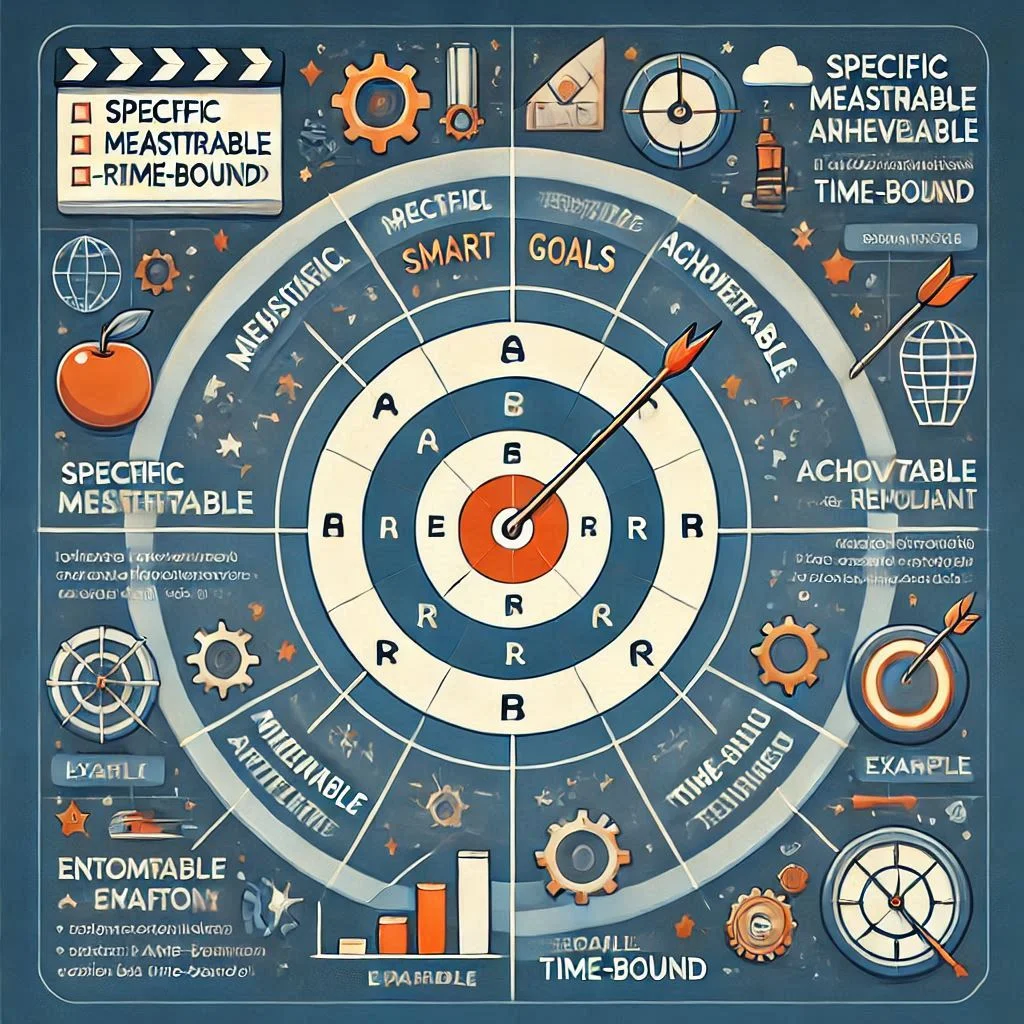
2. Know Your Audience
Understanding your target audience is crucial for crafting personalized and impactful strategies. Conduct research to determine:
- Demographics (age, gender, location)
- Psychographics (interests, values, behaviors)
- Online behavior and purchasing habits
Tools like Google Analytics, Facebook Audience Insights, and surveys can provide valuable insights.
3. Conduct a Competitive Analysis
Analyze your competitors’ strategies to identify gaps and opportunities. Tools like SEMrush or Ahrefs can help you uncover:
- Keywords they rank for
- Backlink profiles
- Social media performance
Use this data to differentiate your approach and offer unique value to your audience.
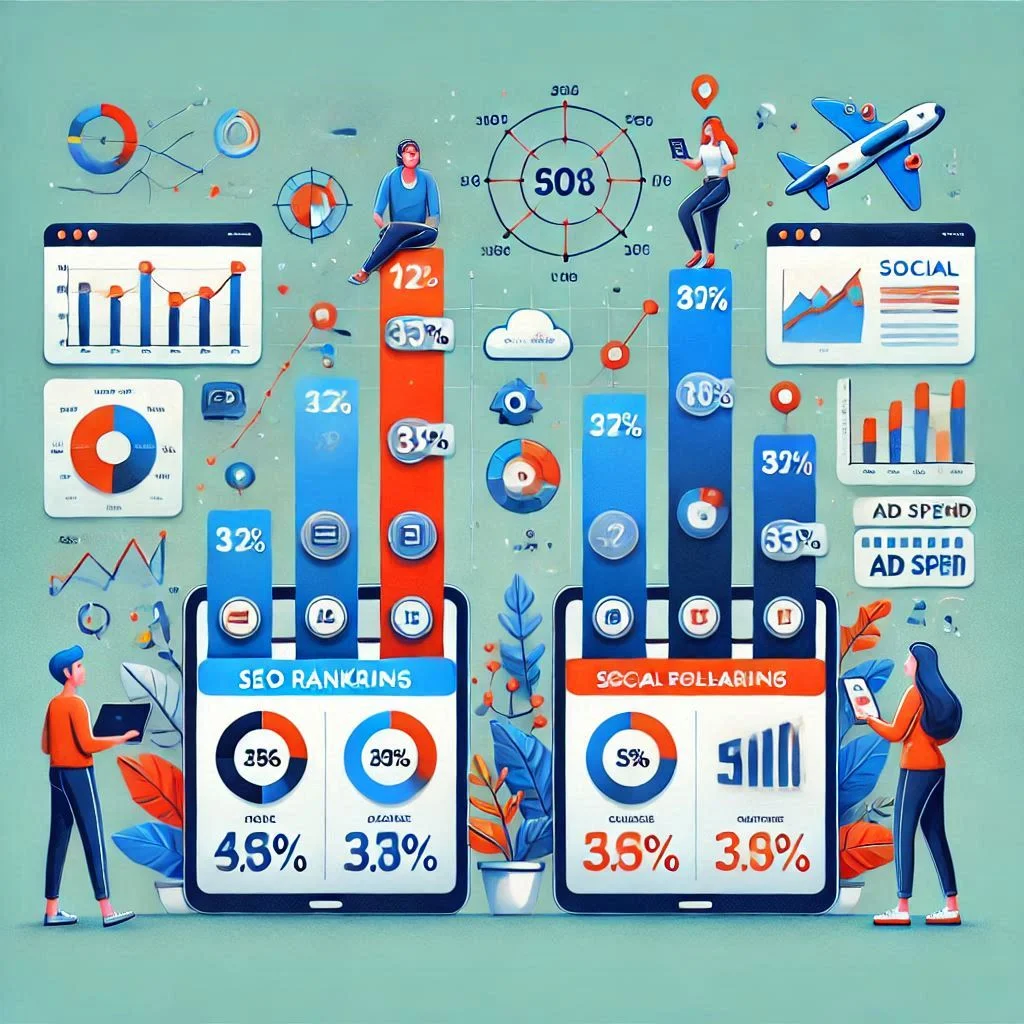
4. Choose the Right Digital Channels
Select digital channels based on where your target audience is most active. Common channels include:
- Search Engines (SEO, SEM): For high-intent users searching for solutions.
- Social Media: For engaging with your audience and building brand awareness.
- Email Marketing: For nurturing leads and maintaining customer relationships.
- Content Marketing: For providing valuable information and establishing authority.
5. Develop a Content Plan
Content is the backbone of your digital marketing strategy. Create a content calendar outlining:
- Topics
- Formats (blogs, videos, infographics, podcasts)
- Publishing schedule
Ensure your content is optimized with relevant keywords, high-quality visuals, and compelling CTAs (calls-to-action).
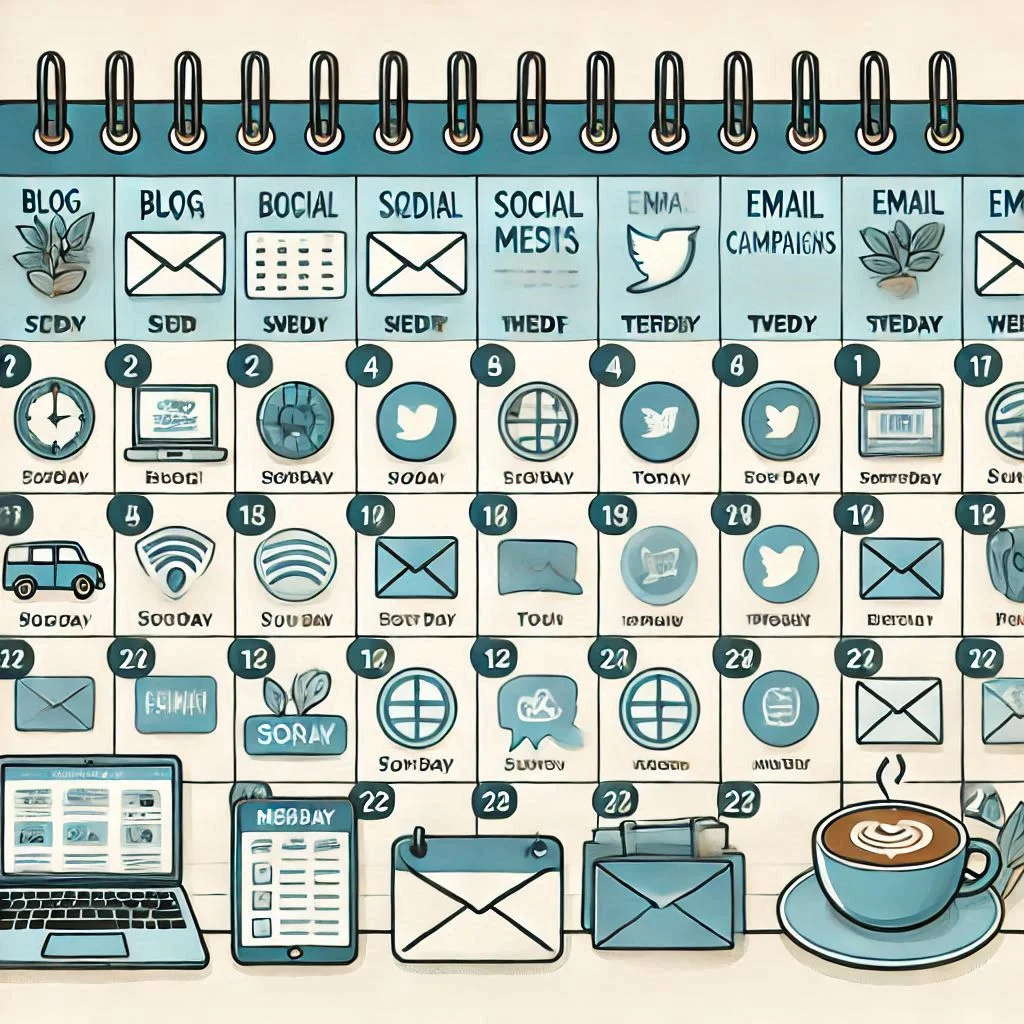
6. Allocate Resources and Budget
Determine the resources (team, tools, time) and budget needed for your campaigns. Allocate funds strategically, prioritizing high-ROI activities like PPC campaigns, email marketing, or SEO tools.
7. Monitor and Optimize
Track the performance of your campaigns using tools like Google Analytics, Facebook Insights, and SEMrush. Key metrics to monitor include:
- Website traffic
- Conversion rates
- Engagement metrics (likes, shares, comments)
- ROI
Regularly analyze the data and adjust your strategies to improve performance.
Aligning Marketing Goals with Digital Channels
To achieve your goals, ensure your digital marketing activities align with the channels most suitable for your objectives:
- Brand Awareness: Focus on social media marketing and SEO to increase visibility.
- Lead Generation: Leverage PPC ads, landing pages, and gated content (like downloadable eBooks).
- Sales Growth: Use retargeting ads, email campaigns, and conversion rate optimization.
- Customer Engagement: Employ interactive content like polls, quizzes, and live Q&A sessions on social media platforms.
Digital Marketing Roles and Responsibilities
Overview of Roles in Digital Marketing
Digital marketing encompasses a variety of roles, each specializing in a specific aspect of online marketing. These roles collaborate to design, execute, and optimize campaigns that drive business growth. Below are the key roles in digital marketing:
- SEO Specialist
Focuses on optimizing websites to rank higher on search engine results pages (SERPs). Tasks include keyword research, on-page optimization, link building, and analyzing website performance using tools like Google Analytics and SEMrush.

- Content Marketer
Develops and promotes valuable content to attract and engage a target audience. This includes blogs, videos, infographics, and eBooks, with a focus on storytelling and addressing user pain points. - Social Media Manager
Handles social media accounts to build brand awareness and engage audiences. Responsibilities include creating posts, running paid ads, monitoring analytics, and engaging with followers. - PPC Specialist
Manages paid advertising campaigns across platforms like Google Ads and social media. Tasks include keyword bidding, writing compelling ad copy, and optimizing ads to maximize ROI. - Email Marketing Specialist
Creates and manages email campaigns aimed at nurturing leads and retaining customers. Responsibilities include crafting email sequences, segmenting audiences, and analyzing open rates and conversions. - Analytics Specialist
Interprets data from various marketing channels to assess campaign performance. They provide actionable insights to optimize strategies and ensure goals are met. - Affiliate Marketing Manager
Builds and manages affiliate programs. This involves recruiting partners, tracking performance, and ensuring affiliates comply with guidelines. - E-commerce Manager
Oversees online stores, optimizing product listings, managing inventory, and running campaigns to drive sales.
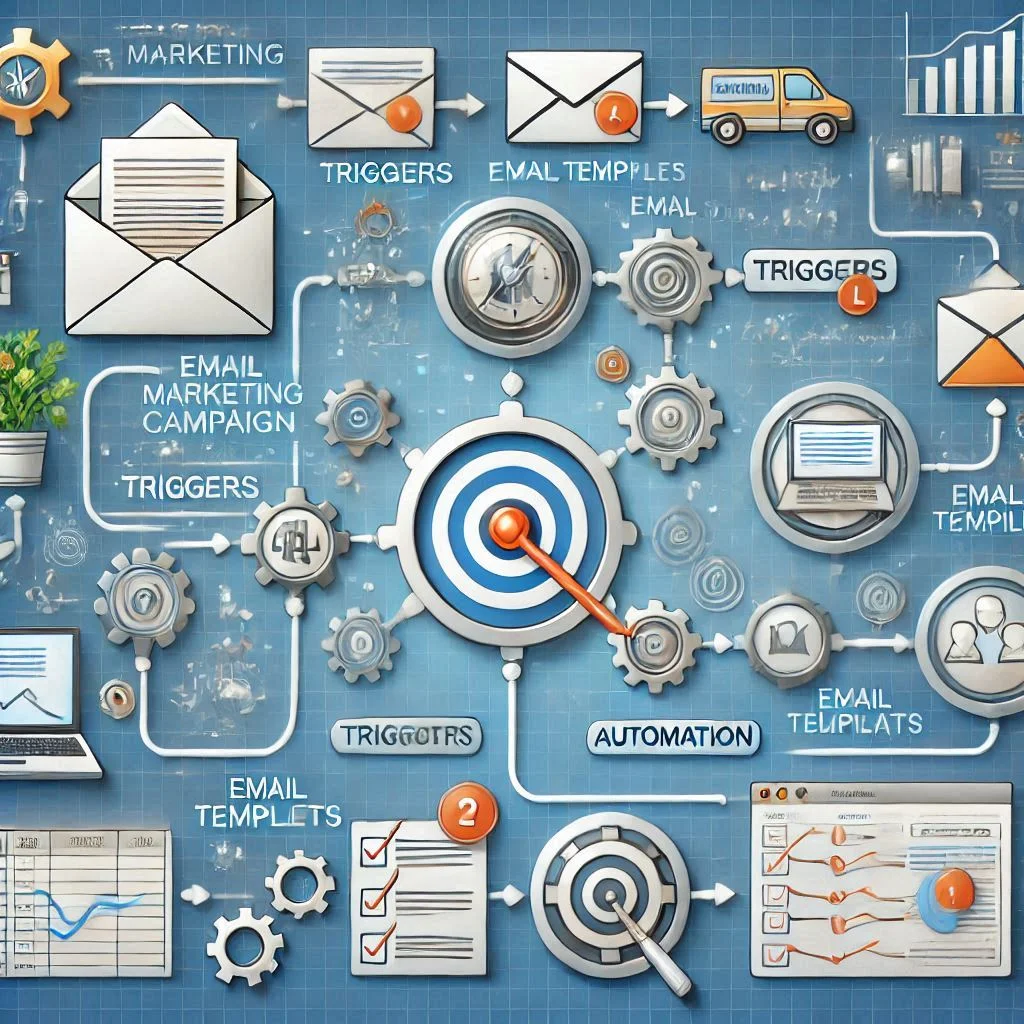
Key Responsibilities and Tasks for Digital Marketers
The responsibilities of digital marketers vary based on their role but typically include the following tasks:
- Strategic Planning
- Setting objectives and key performance indicators (KPIs).
- Designing marketing strategies aligned with business goals.
- Developing engaging content tailored to the target audience.
- Optimizing content with relevant keywords and SEO best practices.Content Creation and Optimization

- Campaign Management
- Planning and executing multi-channel campaigns across social media, email, and search engines.
- Managing budgets and ensuring campaigns stay on track.
- Data Analysis
- Using analytics tools to monitor performance.
- Generating reports and providing insights to improve future campaigns.
- Audience Engagement
- Interacting with followers on social media.
- Responding to customer queries and feedback.
- Search Engine Optimization (SEO)
- Conducting keyword research and competitor analysis.
- Implementing on-page and off-page SEO techniques.
- Paid Advertising
- Designing and managing pay-per-click (PPC) campaigns.
- Testing ad copy, visuals, and targeting options.
- Staying Updated
- Keeping abreast of the latest digital marketing trends, tools, and algorithm updates.
How to Become a Digital Marketer
Steps to Get Started in Digital Marketing
Breaking into digital marketing requires a blend of learning, hands-on experience, and strategic networking. Here’s a step-by-step guide to help you launch your career:
1. Understand the Basics of Digital Marketing
Familiarize yourself with key concepts like SEO, SEM, email marketing, social media marketing, and analytics. Read blogs, watch YouTube tutorials, or explore beginner-friendly courses to build foundational knowledge.
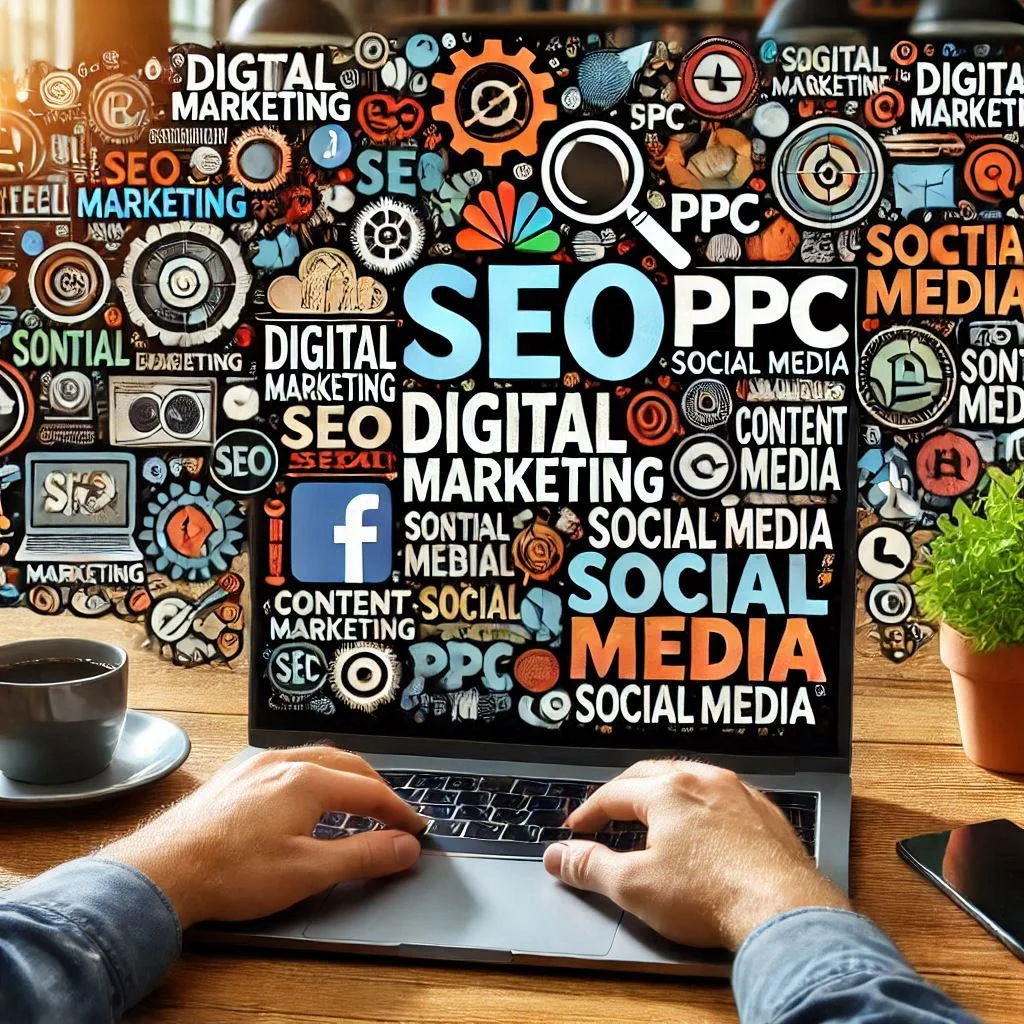
2. Enroll in Digital Marketing Courses
Gain in-depth knowledge by taking online courses or certifications from platforms like Google Digital Garage, Coursera, or HubSpot Academy. Popular certifications include:
- Google Ads Certification
- HubSpot Content Marketing Certification
- Facebook Blueprint Certification
3. Build Practical Skills
Practical experience is essential in digital marketing. Start by:
- Running a blog or YouTube channel to practice content creation and SEO.
- Creating mock ad campaigns using Google Ads or Facebook Ads Manager.
- Volunteering for small businesses or non-profits to gain hands-on experience.
4. Learn Digital Marketing Tools
Master essential tools like:
- Google Analytics for tracking website traffic and performance
- SEMrush or Ahrefs for keyword research and competitor analysis
- Canva for creating visual content
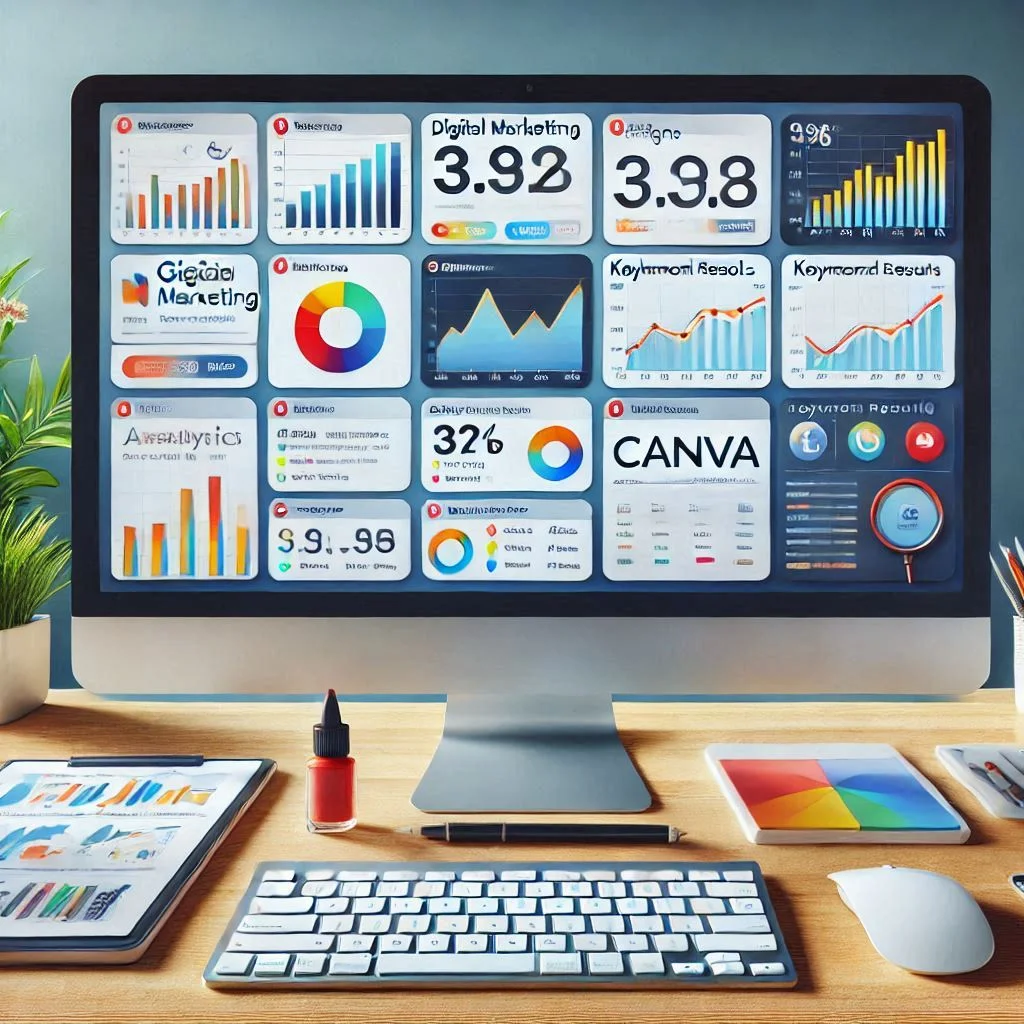
5. Develop a Portfolio
Showcase your skills with a portfolio of projects, including:
- Sample ad campaigns
- SEO-optimized articles or blogs
- Case studies demonstrating results
If you’re just starting, document hypothetical projects or campaigns you’ve worked on as part of a course.
6. Network and Build Connections
Join digital marketing communities on LinkedIn, Reddit, or Facebook. Attend webinars, conferences, and workshops to learn from experts and connect with industry professionals. Networking can open doors to internships or job opportunities.
7. Stay Updated
Digital marketing trends and algorithms change frequently. Stay informed by subscribing to industry blogs like Neil Patel’s Blog, Moz, and HubSpot.
Qualifications, Certifications, and Skills Needed
While formal qualifications aren’t mandatory, they can provide a competitive edge. Here’s what you need to succeed:
1. Education
- A bachelor’s degree in marketing, communications, or a related field is helpful but not required.
- Practical knowledge and skills often outweigh formal education in this field.
2. Certifications
Certifications validate your skills and enhance your credibility. Consider certifications such as:
- Google Digital Marketing & E-commerce
- Facebook Certified Digital Marketing Associate
- HubSpot Email Marketing Certification
3. Skills
The key skills required for digital marketing include:
- Analytical Skills: To interpret data and optimize campaigns.
- Creativity: For content creation and innovative marketing strategies.
- Communication Skills: To convey ideas effectively to teams and audiences.
- Technical Proficiency: Understanding website analytics, SEO, and basic coding.
Free Digital Marketing Course with Certification
Introduction to Free Courses
Digital marketing has become an essential skill set for businesses and individuals alike. The good news is that you don’t need to spend a fortune to learn it. Many reputable platforms offer free digital marketing courses with certifications to help you gain foundational and advanced knowledge in this field.
These free courses are designed to be accessible for beginners and professionals. Whether you want to grow your business, boost your career, or simply learn something new, these courses are an excellent starting point.
Popular Free Digital Marketing Courses Include:
- Google Digital Garage: Offers a comprehensive “Fundamentals of Digital Marketing” course certified by Google.
- HubSpot Academy: Free courses covering topics like inbound marketing, content strategy, and social media marketing.
- Coursera (Auditing Option): Access digital marketing courses from top universities for free (certification optional).
Benefits of Getting Certified in Digital Marketing
Earning a certification in digital marketing comes with numerous advantages:
1. Credibility and Recognition
A certification validates your skills and demonstrates your commitment to learning. It’s a recognized credential that boosts your profile in the eyes of employers and clients.

2. Gain Practical Knowledge
Free courses often include real-world examples, case studies, and assignments. These hands-on elements help you understand how to apply theoretical concepts to actual scenarios.
3. Improved Career Opportunities
Certified professionals are more likely to secure jobs in competitive markets. Certifications can help you land roles like:
- SEO Specialist
- Content Marketer
- Social Media Manager
Employers value certified candidates because they require less onboarding and training.
4. Cost-Effective Learning
Free courses remove the financial barrier to learning, allowing anyone with an internet connection to upskill. This is especially helpful for students, freelancers, or those transitioning careers.
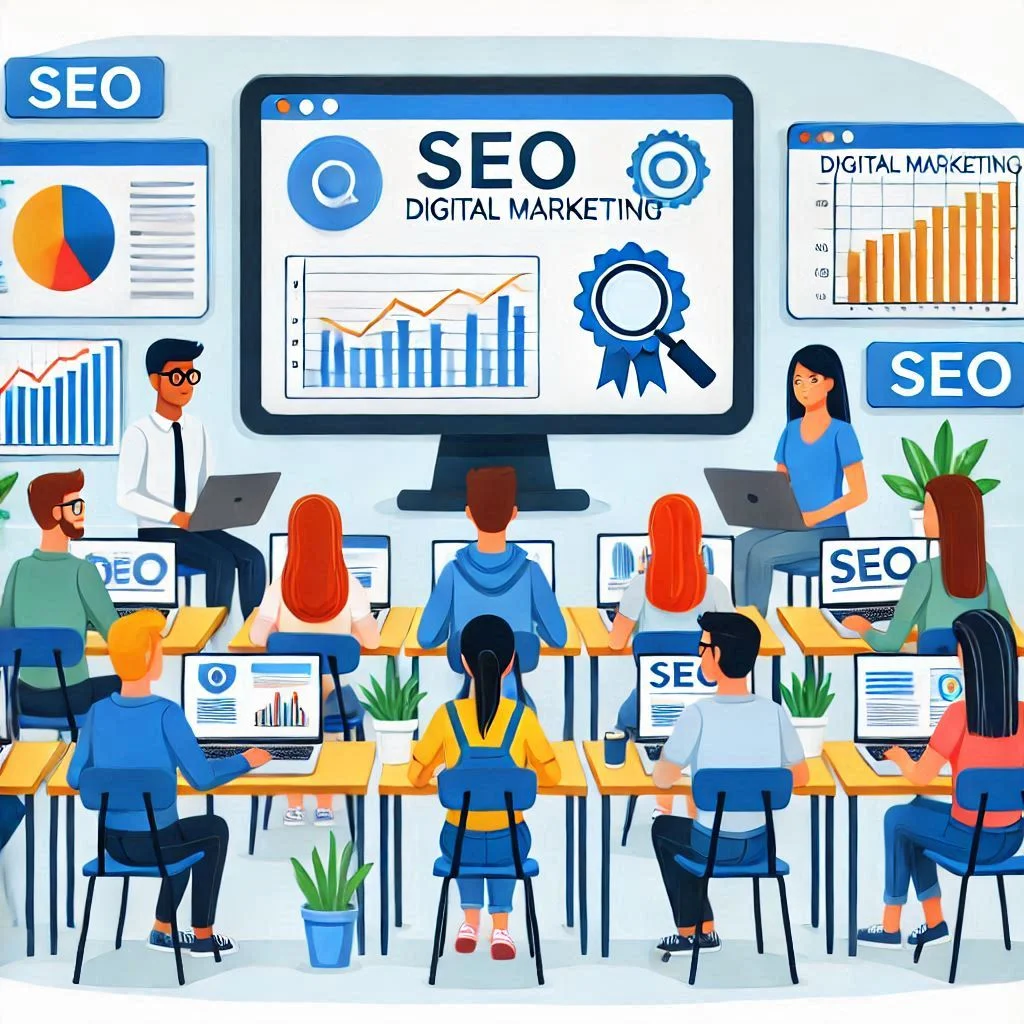
5. Networking Opportunities
Many platforms offering free courses also have community forums or groups. These allow you to connect with peers and industry experts, helping you expand your professional network.
6. Stay Updated
Digital marketing is constantly evolving. Free courses are frequently updated to reflect the latest trends, tools, and algorithms, ensuring your knowledge remains relevant.
Tips for Maximizing Free Courses
- Choose Accredited Platforms: Select courses from reputable organizations like Google, HubSpot, or LinkedIn Learning.
- Dedicate Time: Set aside regular time to complete the course and assignments.
- Implement What You Learn: Start a small project, such as optimizing a blog or running a mock ad campaign, to put theory into practice.

FAQs
What are the 4 main types of digital marketing?
Digital marketing encompasses various strategies to reach and engage target audiences. The four main types are:
- Search Engine Optimization (SEO)
Focuses on improving a website’s ranking on search engines like Google through keyword optimization, content creation, and technical enhancements. - Pay-Per-Click Advertising (PPC)
Involves paid ads displayed on platforms like Google Ads and social media. Advertisers pay when users click on the ads. - Content Marketing
Revolves around creating valuable content (blogs, videos, infographics) to attract and retain an audience. - Social Media Marketing
Utilizes platforms like Facebook, Instagram, and LinkedIn to promote brands, engage audiences, and drive traffic.
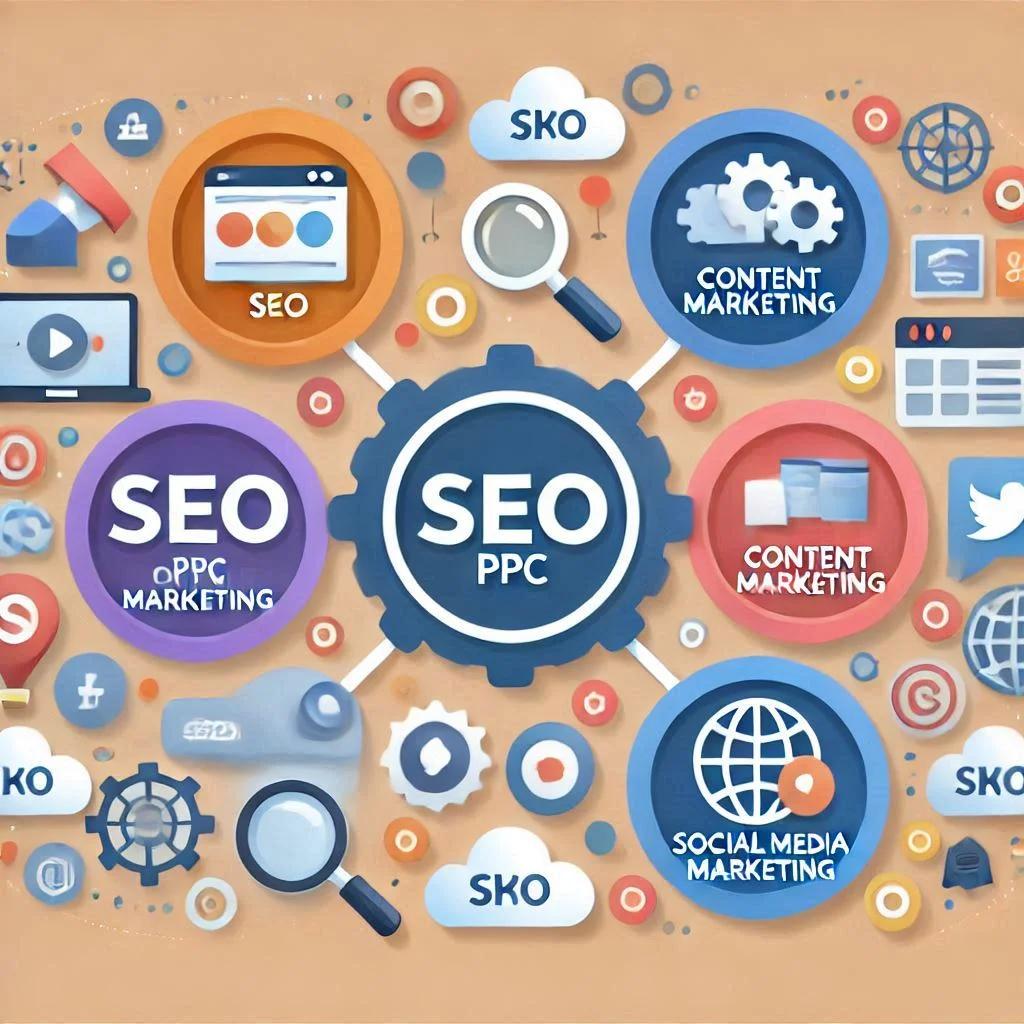
What skills do I need for digital marketing?
To excel in digital marketing, the following skills are essential:
- SEO and SEM Knowledge: For improving website visibility and managing ads.
- Data Analysis: To interpret performance metrics and optimize campaigns.
- Content Creation: Ability to craft engaging content for blogs, videos, and social media.
- Social Media Expertise: Proficiency in managing accounts and leveraging trends.
- Technical Skills: Familiarity with tools like Google Analytics, Canva, and WordPress.
What is the main purpose of digital marketing?
The primary goal of digital marketing is to connect businesses with their target audiences online. It aims to:
- Build brand awareness.
- Generate leads and drive sales.
- Foster customer engagement and loyalty.

Is digital marketing a good career?
Yes, digital marketing is a rewarding career with high demand and growth opportunities. Reasons include:
- Increasing reliance on online platforms for business operations.
- Flexibility to work across industries.
- Opportunities for creative expression and innovation.
- Competitive salaries and remote work options.
Why is digital marketing so powerful?
Digital marketing’s strength lies in its ability to:
- Reach global audiences at scale.
- Deliver targeted and personalized messages.
- Offer measurable results with real-time analytics.
- Adapt to trends and consumer behavior instantly.

How do social media platforms fit into digital marketing?
Social media platforms are vital for:
- Brand Visibility: Reaching millions of users with minimal investment.
- Engagement: Building relationships through comments, shares, and likes.
- Advertising: Running targeted campaigns using demographic and behavioral data.
- Insights: Leveraging analytics to refine strategies.
How can I measure the success of my digital marketing efforts?
Success is measured using key performance indicators (KPIs):
- Website Traffic: Monitor visitors using tools like Google Analytics.
- Conversion Rates: Track actions like purchases or sign-ups.
- Engagement Metrics: Analyze likes, shares, and comments on social media.
- Return on Investment (ROI): Calculate the revenue generated against marketing spend.

Conclusion
Digital marketing has revolutionized the way businesses connect with their audiences, offering unparalleled opportunities for growth, engagement, and success. From understanding the fundamentals of digital marketing to mastering strategies like SEO, content creation, and social media marketing, this field empowers individuals and organizations to thrive in the digital era. Whether you’re a budding marketer or an established professional, embracing the right tools, techniques, and certifications can significantly enhance your impact.
With its dynamic nature, measurable results, and global reach, digital marketing is not just a skill—it’s a gateway to endless possibilities. Equip yourself with the knowledge, stay updated with the latest trends, and take the leap to drive your career or business to new heights in this ever-evolving digital landscape.

